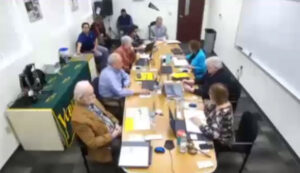Claims using “Yavapai Community College” is derogatory in context in which it is used | Concedes that the legal name is “Yavapai County Community College District (see video clip)
 The November 16 Yavapai Community College District Governing Board meeting found time to listen to a grievance by Board member Ray Sigafoos about those persons who refer to the institution as “Yavapai Community College.” Rather than “Yavapai College.”
The November 16 Yavapai Community College District Governing Board meeting found time to listen to a grievance by Board member Ray Sigafoos about those persons who refer to the institution as “Yavapai Community College.” Rather than “Yavapai College.”
According to Mr. Sigafoos, the institution has always been called “Yavapai College” and he has a “serious adverse” reaction every time he reads “Yavapai Community College.” He interpreted the use of the name “Yavapai Community College” as derogatory claiming its use “is pejorative, it’s targeted.” According to Sigafoos, referring to the Yavapai County institution as a community college “misunderstands” the institution’s entire purpose. He did not elaborate. (See video clip for context.)
Sigafoos suggested that the label “Yavapai College” is used for marketing and “branding.” He noted that at least one other institution, Arizona Western Community College, uses the name “Arizona Western College.”
Sigafoos also noted that in two years Yavapai may be awarding four-year degrees. If that happens, he claimed “it is better to have a diploma that says `Yavapai College’ for four years in a nursing program” than have a four-year degree saying, “Community College.” According to Sigafoos, “it sounds better.”
Representative Chris Kuknyo noted during the Board discussion that the institution was originally created as “Yavapai Community College.” Sigafoos admitted that the legal name is “Yavapai County Community College District.”
Mr. Kuknyo also commented that when the word “community” is used it may bring in a “whole different focus to an organization.” He went on to say that there have been times when the community has “perceived us as an elitist group of people and unless you have the money to sign up for all the events you are never going to get in to see a show” – it is only for the elite. (See video clip for complete context.)
From the Blog’s perspective, when entities use “college” and “community college” as a part of their name they are projecting quite different word pictures. The reason for that is that there are significant commonly understood differences associated with the use of “community college” and “college.” Here are a few examples:
- The types of degrees offered is a major difference between community colleges and four-year colleges and universities. Community colleges offer professional certificates and/ or an associate degree after two years of study. Colleges offer a variety of degrees after four years of study.
- Community colleges have lower tuition and fees than colleges. At public, four-year colleges, the average in-state tuition and fees were $10,440 in 2019-2020 and out-of-state tuition and fees were $26,820, according to the College Board’s 2019 Trends in College Pricing report. Comparatively, the average in-district tuition and fees at public two-year colleges in the same year were just $3,730.
- Most community colleges do not require standardized admissions tests (only a test of English for international students). Colleges may require that students have taken standardized admissions tests, possess minimum grade point averages, and meet other criteria.
- Community colleges offer flexible course schedules to accommodate students’ lives outside of school. Most colleges do not.
- A high school diploma is not usually required to attend a community college. Colleges require a high school diploma.
- Community college instructors spend most of their time teaching and working with students, according to the Bureau of Labor Statistics. They usually don’t spend as much time working on research as their counterparts at four-year institutions.
- Community colleges are typically commuter schools. The average student at community colleges tends to be older than students attending a college.
- The average age of a community college student is 28, according to the American Association of Community Colleges. About two-thirds of community college students attend school part time. Most students work either part or full time.
- Many community colleges offer a selection of student organizations that students can become involved with, but the social atmosphere at community colleges tends to be drastically different from that at residential four-year colleges and universities.
- Colleges are usually state or privately supported. A community college is considered “local” and often supported by local taxpayers.
It seems obvious that it is far more correct to refer to Yavapai College” as “Yavapai Community College.”
